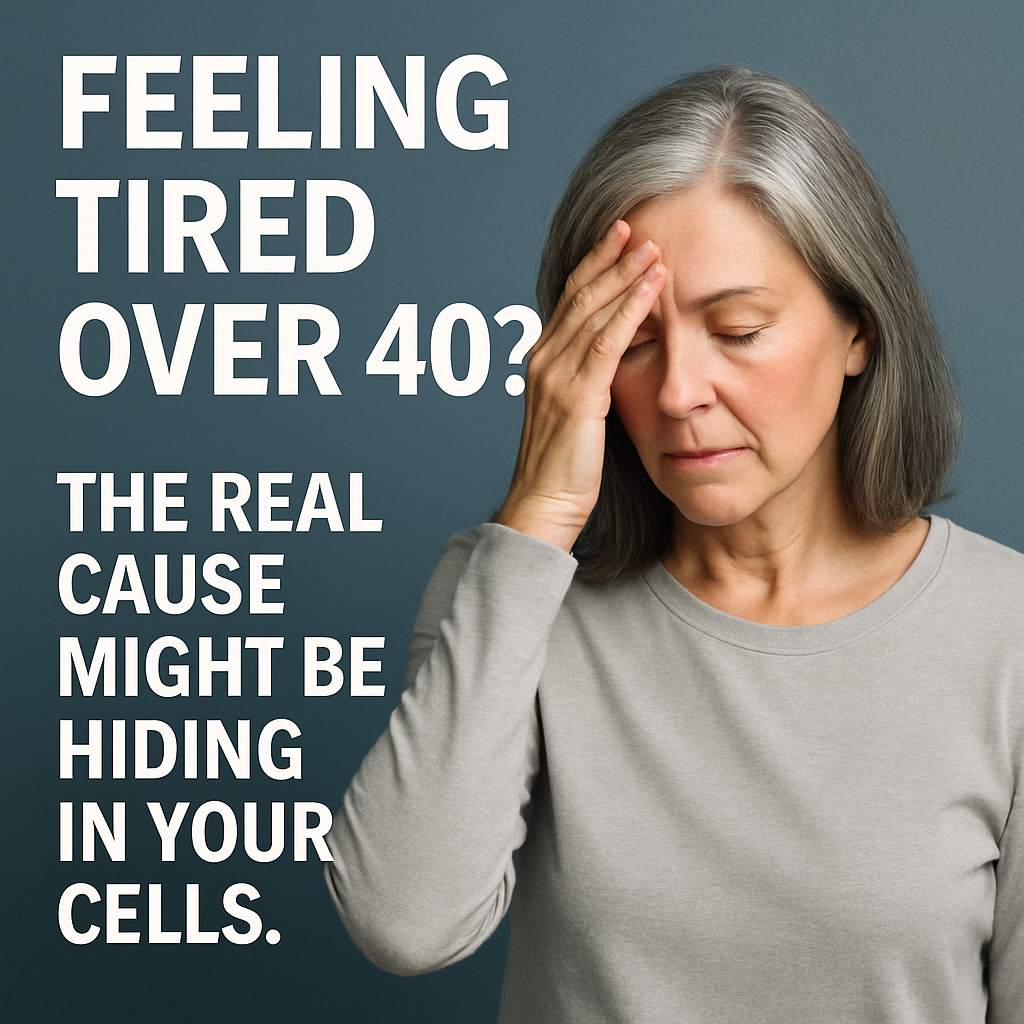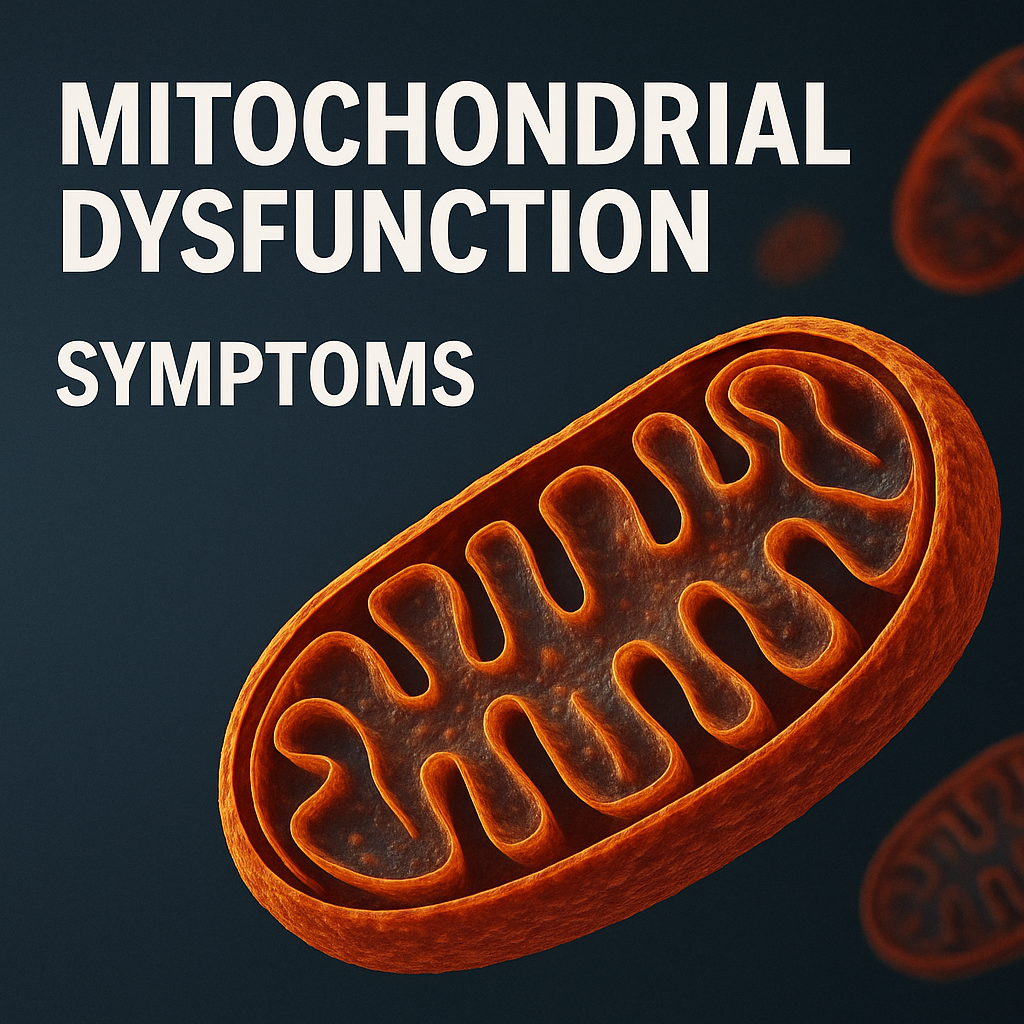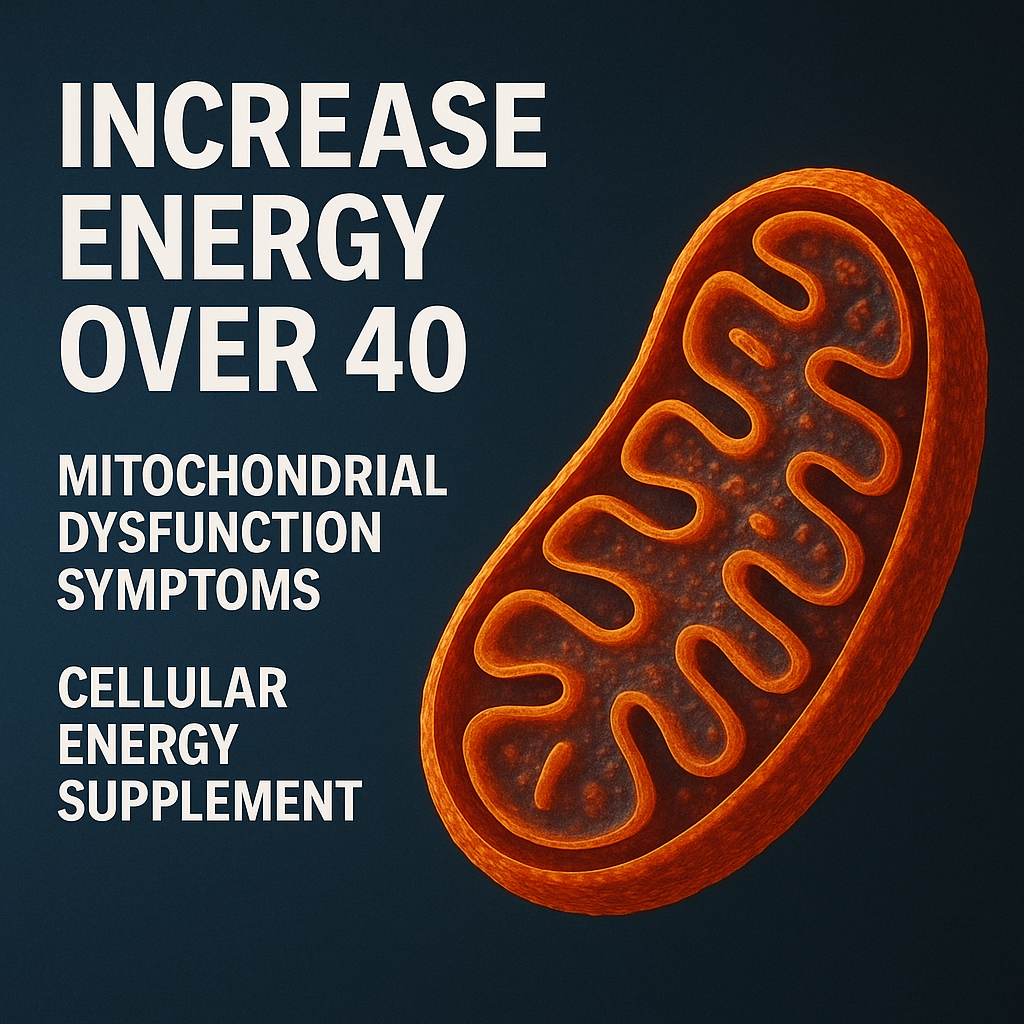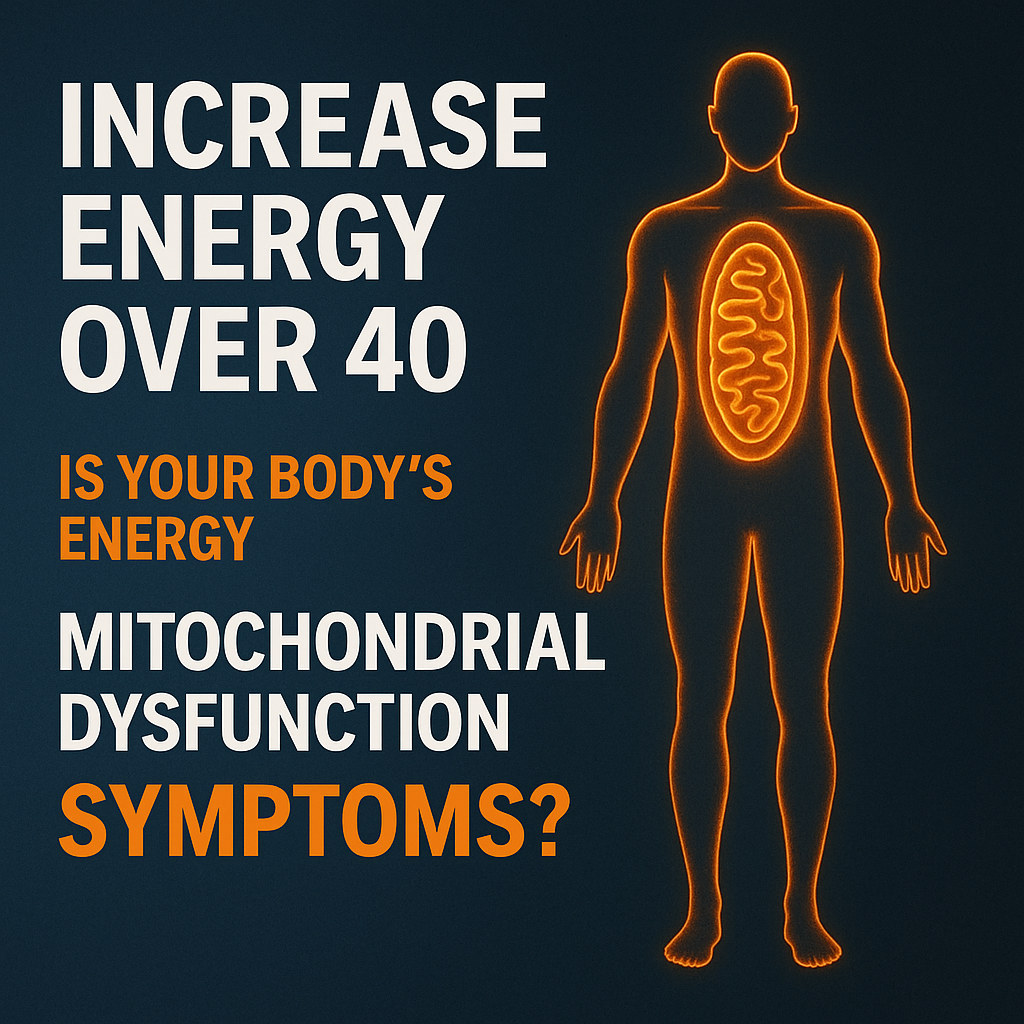Understanding Fatigue After 40. Stop Feeling Tired
As we pass the age of 40, many of us start noticing a frustrating dip in energy. Simple tasks seem more exhausting, afternoons drag on, and that spark we once had feels… well, dimmed. But contrary to popular belief, this isn’t just “getting older.” There’s a deeper, cellular reason behind this persistent fatigue.

Common Misconceptions About Aging and Energy
Most people chalk up low energy to aging, thinking it’s unavoidable. However, not everyone experiences this decline the same way, and it’s not always age alone to blame.
Why Your Body’s Energy Naturally Dips Post-40
As we age, changes at the cellular level—particularly in our mitochondria—begin to limit how efficiently our bodies convert food into energy. This isn’t just about feeling tired; it’s about a fundamental slowdown in how we power every cell in our body.
Meet the Mitochondria – Your Cellular Powerhouses
Your body is home to trillions of cells. Within each one are tiny structures called mitochondria—think of them as microscopic batteries that generate the energy needed for your organs, muscles, and brain to function.

What Mitochondria Do
Mitochondria convert nutrients from food into adenosine triphosphate (ATP)—the energy currency of life. They’re essential for everything from brain function to muscle contraction.
How They Generate Energy
These cellular engines take oxygen and glucose and perform a biochemical process known as cellular respiration, producing the energy your body uses to stay active and alert.
What Is Mitochondrial Dysfunction?
When mitochondria fail to work properly, your cells don’t get enough energy. This condition is known as mitochondrial dysfunction, and it’s more common than you might think—especially after 40.
Signs and Symptoms to Watch For
Some of the most overlooked symptoms include:
- Persistent fatigue
- Brain fog
- Poor exercise tolerance
- Unexplained muscle weakness
- Mood disturbances
Causes and Risk Factors
Mitochondrial issues can stem from oxidative stress, inflammation, poor nutrition, environmental toxins, and even prolonged stress.
Top Mitochondrial Dysfunction Symptoms Over 40
The signs can be subtle at first but gradually become disruptive:
Chronic Fatigue and Brain Fog
If you feel drained despite getting enough rest, or struggle with memory and focus, your mitochondria might be underperforming.
Muscle Weakness and Poor Endurance
Less ATP means muscles can’t contract efficiently, leading to early fatigue during physical activity.
Memory Issues and Mood Swings
Since your brain consumes a lot of energy, mitochondrial problems can lead to decreased cognitive function and emotional instability.
The Hidden Link Between Aging and Cellular Energy Loss
Aging doesn’t automatically equal poor energy—but mitochondrial health plays a major role.
How Mitochondria Change with Age
Mitochondria lose efficiency, become fewer in number, and generate more harmful byproducts like free radicals as we age.

The Oxidative Stress Connection
Free radicals can damage mitochondrial DNA, accelerating aging and reducing energy production even further.
Diagnosing Mitochondrial Problems
Doctors often overlook mitochondrial dysfunction unless it’s severe. However, there are ways to assess your cellular health.
Medical Tests and Evaluations
Specialized blood tests, metabolic panels, and biopsies can detect abnormalities in energy metabolism.
What Your Doctor Might Look For
Key markers include elevated lactate, abnormal carnitine levels, and signs of oxidative stress.
Natural Ways to Increase Energy Over 40
Fortunately, you can take charge of your energy levels without relying solely on caffeine or naps.
Diet Changes That Support Mitochondria
Eat foods rich in:
- Antioxidants (berries, dark chocolate)
- Omega-3s (fatty fish, walnuts)
- B-vitamins (leafy greens, legumes)
Exercise Routines That Stimulate Energy Production
Aerobic activities and resistance training have been shown to stimulate mitochondrial biogenesis—the creation of new mitochondria.
Cellular Energy Supplements That Work
Smart supplementation can offer a significant energy boost—especially if your mitochondria are struggling.
CoQ10 and NAD+ Explained
- Coenzyme Q10: A vital antioxidant that helps produce ATP.
- NAD+ Precursors: Boost cellular repair and mitochondrial efficiency.
How to Choose the Right Supplement
Look for brands with clinical backing, transparency, and third-party testing. Avoid formulas loaded with fillers or artificial ingredients.
How Lifestyle Affects Cellular Energy
Your daily habits significantly impact mitochondrial function—and, by extension, your energy levels.
The Role of Stress, Sleep, and Toxins
- Chronic stress raises cortisol levels, which can impair mitochondrial activity.
- Poor sleep prevents mitochondria from completing their nightly repair cycle.
- Environmental toxins like pesticides, heavy metals, and processed foods cause oxidative stress that damages cells.
Daily Habits That Protect Your Mitochondria
- Get at least 7–8 hours of quality sleep
- Minimize exposure to pollutants
- Practice mindfulness or meditation
- Stay hydrated with filtered water
- Avoid excessive alcohol and smoking
The Science Behind Energy Boosting Over 40
Several peer-reviewed studies support interventions that enhance mitochondrial health.
Clinical Studies and Peer-Reviewed Data
- A 2018 study in Cell Metabolism found that NAD+ supplementation improved mitochondrial performance in adults over 40.
- Research published in the Journal of Clinical Nutrition shows that CoQ10 supplementation reduced fatigue and improved energy in people with mitochondrial disorders.
Real-Life Testimonials and Case Studies
Many over-40 adults report increased stamina, better sleep, and clearer thinking after adopting mitochondrial-boosting routines. These success stories align with what science says about improving cellular energy.
Cellular Energy Supplement Success Stories
Inspiring Stories From Individuals Over 40
- Linda, 47: After feeling exhausted for years, she started taking a high-quality NAD+ supplement and says, “I feel like I got a decade of my life back.”
- Marcus, 52: A health coach who incorporates mitochondrial-focused nutrition and reports higher energy levels and sharper mental clarity.
Before-and-After Experiences
People who have integrated a cellular energy supplement alongside proper diet and exercise report transformative results—often within weeks.
Risks of Ignoring Mitochondrial Health
Neglecting your mitochondrial well-being isn’t just about feeling tired—it has broader consequences.
Potential Long-Term Impacts
Chronic mitochondrial dysfunction has been linked to:
- Type 2 diabetes
- Neurodegenerative diseases (like Parkinson’s and Alzheimer’s)
- Heart disease
- Chronic fatigue syndrome
Diseases Associated With Mitochondrial Decline
As the cellular engines slow down, your entire system is affected. Long-term fatigue is just the tip of the iceberg.
Can You Restore Mitochondrial Function?
The good news? Yes, with the right steps, you can revive your cellular power.
What Science Says
While you can’t turn back the clock, mitochondrial function can be rejuvenated. This includes increasing ATP production, reducing oxidative damage, and supporting mitochondrial repair and growth.
Steps to Start Recovery Now
- Eat a nutrient-dense, anti-inflammatory diet
- Exercise consistently (both cardio and strength)
- Supplement wisely with CoQ10, NAD+, PQQ, or alpha-lipoic acid
- Manage stress effectively
- Prioritize sleep and recovery
Expert Tips to Maintain Energy for Life
Biohacks and Longevity Strategies
- Try intermittent fasting to promote autophagy
- Use cold exposure or sauna therapy to stimulate mitochondrial resilience
- Practice deep breathing to enhance oxygen utilization
Personalized Plans for Energy Optimization
Consider genetic testing or working with a functional medicine doctor to tailor your approach. Everyone’s mitochondrial health is different.

FAQs on Mitochondrial Health and Energy Over 40
Q1: What causes mitochondrial dysfunction after 40?
Aging, oxidative stress, poor diet, environmental toxins, and chronic stress are the main culprits.
Q2: Can supplements really improve mitochondrial health?
Yes—especially ones like CoQ10, NAD+, and PQQ which are backed by scientific research.
Q3: How long does it take to feel more energetic after starting a cellular energy supplement?
Many users report improvements within 2–4 weeks, though results can vary.
Q4: Is there a blood test for mitochondrial function?
While not routine, specialized metabolic and genetic tests can assess mitochondrial activity.
Q5: Are mitochondrial supplements safe?
Most are safe when used as directed. Always choose high-quality, third-party-tested products.
Q6: Can exercise really grow new mitochondria?
Absolutely! This process is called mitochondrial biogenesis, and it’s triggered by regular aerobic and resistance exercise.
Conclusion: Empower Your Cells, Reclaim Your Energy
If you’re feeling tired over 40, the real issue may not be your age—but your cells. Mitochondrial dysfunction is an often-overlooked cause of fatigue, yet the solutions are within reach. From smart supplements to lifestyle upgrades, you can increase energy over 40 by addressing the root cause—cellular energy loss.
Take the first step today. Your cells—and your energy—will thank you.



